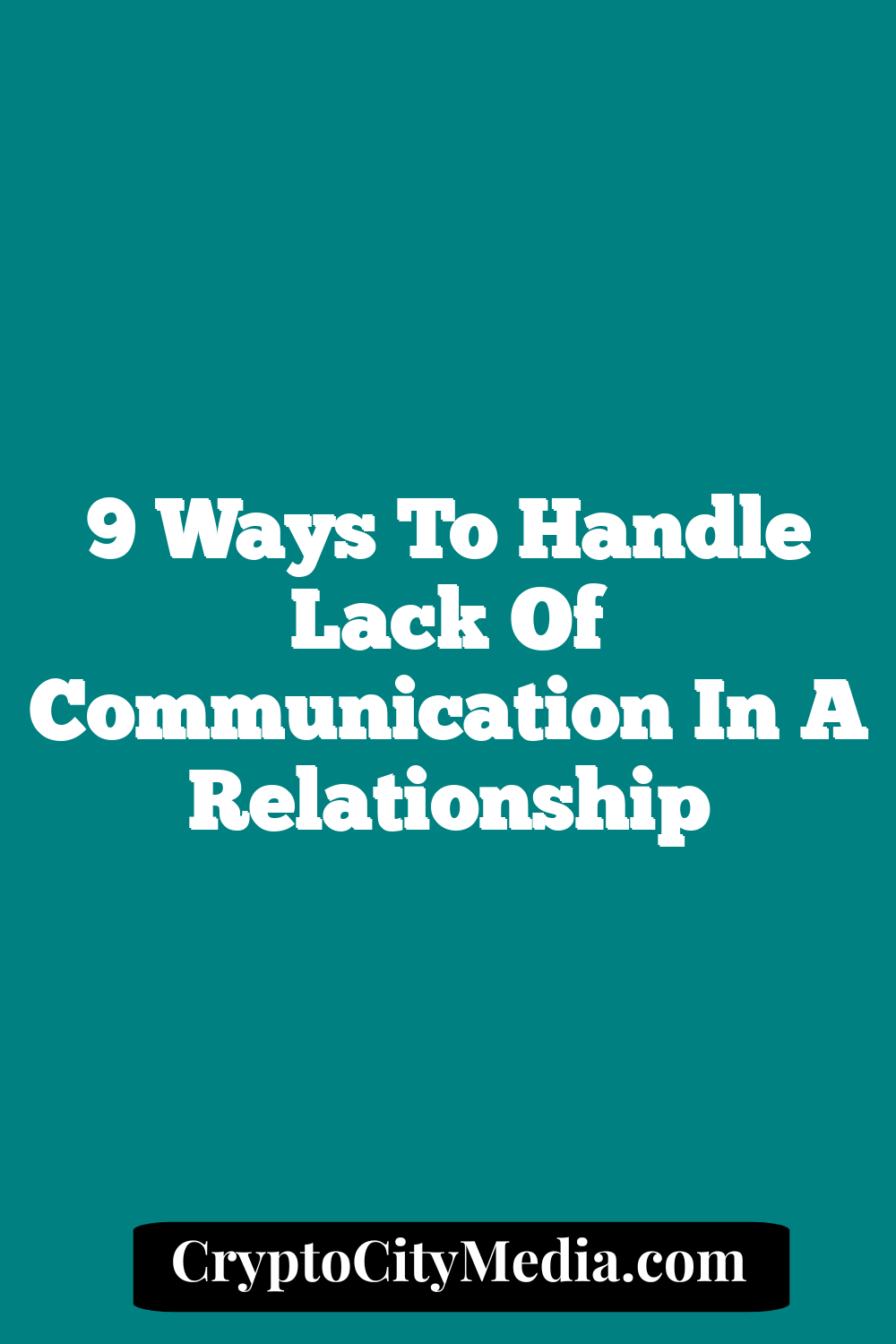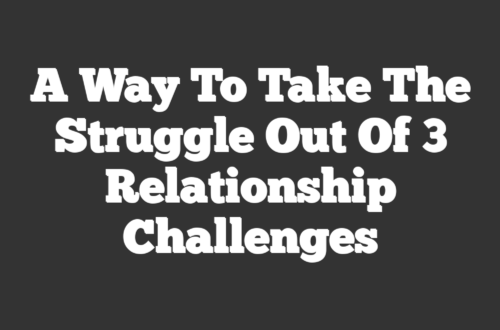
Lack of communication in a relationship may sound like a benign issue. However, poor communication will only lower your chances of having a healthy relationship.
Everyone prefers a different communication style, but if your communication style hurts your partner’s feelings, then you may have a problem.
Finding a productive communication method with your partner is a basic need if you want your relationship to survive in the long term. There is a reason people say that communication is key in any relationship.
If you love your significant other and are not ready to leave them behind, then stick around to find out the best ways to fix the lack of communication in a relationship.
9 Ways To Fix Lack Of Communication In A Relationship
Different approaches can be taken to address the issue of poor communication in relationships. Some of these strategies are simpler than others.
Here are some suggestions on how to establish good communication habits in your relationship, whether you’re trying to fix a lack of communication or just wish to talk to your partner more.
1. Vulnerability is good
Vulnerability is both a good and bad thing. When vulnerability is not shown in a relationship that is struggling, then vulnerability is not a great thing.
Yes, it is possible to maintain a relationship without being vulnerable… But what kind of relationship is that? It is nothing but a superficial one. Vulnerability brings out the most fragile things in us.
You can think of vulnerability as a gateway to truly understanding a person. Every one of us has a vulnerable side – we just need to figure out who needs to meet this side of us and who doesn’t.
People yearn to be deeply and fully known. You can’t know you are fully loved until you know you’re fully known. This especially applies to your significant other, as this is the person you will probably spend the rest of your life with.
However, I know that certain people may find it difficult to be vulnerable. The truth is that being in a relationship involves sharing aspects of yourself with your partner, both positive and negative.
How to achieve vulnerability
Try to remember that being weak is okay. Let your guard down when you’re with your partner; trying to hide your feelings will only result in misunderstandings and further communication issues.
It might be intimidating to bring up difficult or delicate things, but if you keep ignoring the issue, nothing will change, and misconceptions will only grow worse. If either or both of you are hesitant to open up, you cannot expect to connect with one another successfully.
Don’t be scared to suppress what has to be stated. When anything is bothering you or if something in your relationship isn’t working well, your spouse deserves to know.
When neither of you is capable of expressing yourselves to one another, how else will you be able to resolve a lack of communication?
2. Maintain a habit of communication
A large sit-down once a week or a spectacular effort doesn’t have to happen to maintain a routine of communicating.
When resolving a lack of communication in a relationship, start small. Start with the simplest things, as talking is better than not talking at all. Simply check in on your partner sometimes or ask them how their day was.
Technology is now often considered something bad for a couple, but when it comes to improving a lack of communication, it can be a great solution.
Even when your spouse is not around physically, you can continue to communicate with them via phone or social media. Throughout the day, send them an encouraging SMS or leave kind comments on their Instagram stories.
This tiny but substantial effort will reveal your level of commitment to your partner. It can also make you more comfortable with the thought of letting the other in, no matter how fragile the connection might be.
This can gradually result in you both feeling more at ease conversing with one another, whether it be about amusing topics or more crucial parts of your relationship.
3. Ask the right questions
Always remember that your partner isn’t a mind-reader. At all costs, do not ever make assumptions about what your partner wants.
Even though you’ve known them for several years, you cannot always read their mind and know what they want. You may learn more about your partner’s preferences by asking questions and vice versa.
Furthermore, it paves the path to developing effective communication in your relationship because it will be much simpler to understand one another by simply asking a question or two.
This enables the two of you to communicate actively and learn about each other’s points of view. In addition, it is not only important to ask questions but to ask the right ones.
‘‘How was your day?’’ is a great question, but will you really be able to provoke a deeper conversation with this question? Probably not.
That’s why it’s crucial to know what questions to ask. These questions show a desire for dialogue and affection for your partner.
They have the advantage of showing your partner that you deeply appreciate them and of encouraging teamwork. They elicit attention and serve as a conduit for interaction, understanding, and communication.
4. Listen carefully
Acquiring information, understanding a person or situation, and enjoying yourself are the purposes of deep listening. It is about concentrating entirely on people, their messages, and their words without being distracted.
Relationship communication involves more than a simple verbal exchange. Being able to pay attention to even the smallest details of your partner’s communication is necessary for active listening.
Instead of just hearing the words that they say, concentrate on what they are saying and attempting to express. It might be difficult to swallow your pride, but refusing to listen to the other person and strongly sticking to your viewpoint will only make things worse.
Competing with the need to be heard will, more often than not, simply mute one or both individuals further. If you can’t even pay attention to what your partner is saying, you won’t be able to improve the lack of communication in your relationship.
5. Pay attention to body language
Recognizing your partner’s non-verbal cues and signals is a crucial component of active listening. This can involve vocal intonation, eye contact, and facial emotions.
Observe their body language both during and after discussions or conflicts. Even if they don’t verbally communicate how they feel, their nonverbal behavior might be a good indicator.
On the opposite end of the scale, how your partner sees you can be greatly influenced by your body language. Keep your emotions under control, as you can unintentionally come across as aggressive or disinterested.
When the other person misinterprets your response to the situation, it can cause a lot of misunderstandings in the relationship.
By paying closer attention to these things, you may start to become more aware of your partner’s nonverbal signs, which can help you overcome the communication gap.
By doing this, you can try to settle conflict quickly and stop it from getting worse.
6. Know when to talk
Every activity has its proper time and place. Consider more than simply calendar convenience when choosing the best time to discuss issues with your significant other.
It might be difficult to find the time to improve communication problems. However, it’s also crucial to make sure that you and your partner truly have the same mindset.
Prior to asking to communicate, make sure neither of you is angry or upset. If you need a time out, take it… Despite the fact that I advise being honest and open with your partner, talking things out when one person is highly emotional might result in poor communication.
7. Balance is everything
Communication skills include both listening and being heard. However, sometimes it is really hard to know the right ratio for those two things.
If you want a successful relationship, you must be able to strike a balance between hearing your partner out and expressing yourself effectively. As crucial as it is to actively listen, it may also be necessary to make sure you’re being heard.
In your relationship, don’t forget to take care of your personal interests while also keeping in mind those of your partner.
Do not forget that relationships are about giving and receiving. You and your partner’s lack of communication in a relationship may be made worse by your failure to strike a balance between talking and listening.
8. Respect your own boundaries
In every good relationship, setting boundaries is essential. You will learn to appreciate the differences between you and your spouse when you establish boundaries.
They may also assist you in understanding that your partner has a different point of view. This will only be helpful in disagreements or miscommunication.
Healthy boundaries can make you both feel more at ease while speaking to one other, as you’ll know what topics can and cannot be discussed.
9. Talk about problems
You may be having relationship issues as a result of a tough event in your relationship that hasn’t been fully handled. Maybe there was a betrayal, or something was said that was never adequately explained.
You’ll need to work through these wounds, reestablish trust, and demonstrate your willingness to forgive one another to move forward and start talking better.
See also: How To Communicate With Men: 16 Ways To Have Better Communication
6 Signs Of Lack Of Communication In A Relationship
It becomes risky for the future of your relationship if there is a communication breakdown that neither you nor your partner is ready to address.
6 communication patterns that may indicate your relationship won’t last long are listed below.
1. They constantly lie to you
There is no way to have better communication if your partner constantly feels the need to lie to you.
It becomes even worse if they are little lies because this will only trigger your insecurities, and you will doubt every other thing they say to you.
2. Silent treatment
It is totally normal to want some space after a fight. However, this method of distancing and not speaking at all may drive you away from your partner. It may have serious effects on your well-being and mental health.
Stonewalling is even worse. Walking away in the middle of an argument tells you that your partner isn’t interested in finding a solution and, in the end, doesn’t care enough about you.
3. They think you read minds
If anything is upsetting you in a relationship, the only way to solve it is to genuinely express your thoughts to your partner and then agree on a solution together.
A partner who expects you to understand their thoughts and fix all of their problems for them without open communication is not a healthy one.
4. One-word answers
It is okay that some people prefer chatting and others don’t. But if you experience short, one-word answers early in the relationship, then this can be a huge red flag and a sign that you cannot expect healthy communication from that person.
5. They don’t talk about their problems
In order for you and your partner to prevent further big problems, you need to talk about past problems. A partner who doesn’t talk about those problems and doesn’t acknowledge their faults will never bring the two of you to the level of emotional intimacy that you require.
6. Passive-aggressive behavior
One of the telltale signs to look out for in a relationship is if there is a lot of passive-aggressive communication. Bad communication is characterized by silent treatments, jokes that are actually thoughts, condescending responses, assigning blame, and yelling over trivial issues.
FAQs
How does lack of communication affect relationships?
Lack of communication will only badly affect a relationship. From bad communication, an avalanche of other problems arises.
Lack of communication leads to constant lying, lack of emotional intimacy, and no respect for your personal boundaries. Lying may cause further problems like not having trust in your partner and developing serious insecurities.
Lack of emotional intimacy will drive you away from each other, and it can culminate in a breakup.
Can a relationship survive without communication?
The answer is yes. However, the odds for this survival are very low.
Communication is the key to a successful, long-term relationship. Without communication, you may be able to maintain a relationship.
However, the quality of that relationship is questionable.
If you want a superficial relationship with lots of problems, no trust, and emotional intimacy, you can get this whole package just by having bad communication with your partner.
Final Words
The importance of communication in a relationship is significant to the extent that it can totally change the course of your relationship.
Lack of communication in a relationship has many consequences, and none of them are good. There is no trust in those relationships and no real emotional intimacy. One of the ways to improve bad communication is to talk about problems and show your vulnerable side.
Don’t forget, body language is a communication style as well. Try everything in your power to make your relationship a healthy one, but also know your boundaries and when enough is enough.
Remember: communication is the key to a successful relationship. If there is no communication, there is no relationship!




